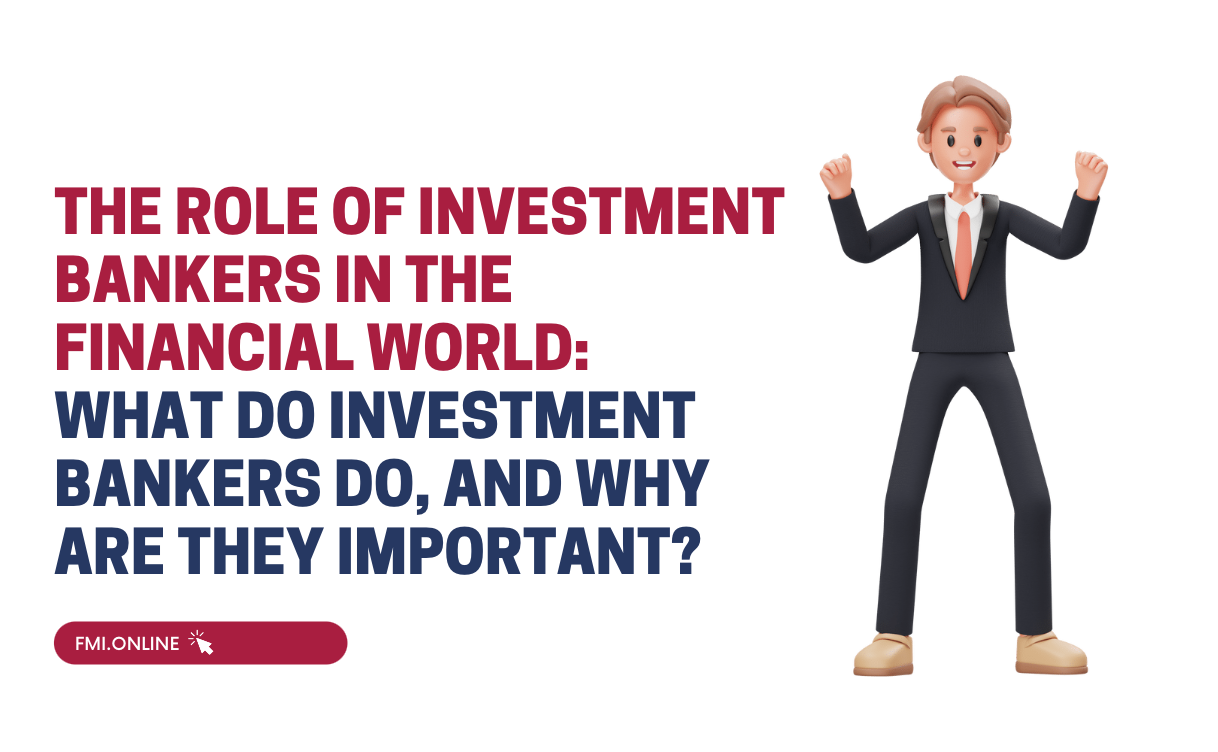Investment banking is a crucial part of the financial world. It plays a vital role in capital markets by connecting investors with businesses that require funding. Investment bankers are responsible for managing and executing complex financial transactions that facilitate capital formation, mergers and acquisitions, and corporate restructuring. In this article, we will explore the role of investment bankers in the financial world, what they do, and why they are important. We will also discuss how FMI’s investment banking pathway can help those interested in pursuing a career in this field.
What is Investment Banking?
Investment banking is a financial service that helps businesses and governments raise capital by underwriting and issuing securities. It also provides strategic advice to companies on mergers and acquisitions, corporate restructuring, and other complex financial transactions. Investment bankers act as intermediaries between issuers of securities and the investors who buy them. They help companies determine the most appropriate method of raising capital, whether through an initial public offering (IPO), debt issuance, or private equity.
Investment bankers are divided into two main groups: the front office and the back office. The front office is responsible for generating revenue and includes roles such as corporate finance, sales and trading, and mergers and acquisitions. The back office supports the front office and includes roles such as operations, risk management, and compliance.
What do Investment Bankers do?
Investment bankers are responsible for managing and executing complex financial transactions that facilitate capital formation, mergers and acquisitions, and corporate restructuring. They provide strategic advice to companies on how to raise capital, structure deals, and navigate the regulatory environment.
Capital Formation:
Investment bankers help companies raise capital by underwriting and issuing securities. They work with issuers to determine the most appropriate type of security, such as equity or debt, and the most appropriate method of issuance, such as an IPO or private placement. Investment bankers also help determine the appropriate pricing for the securities and market them to potential investors.
Mergers and Acquisitions:
Investment bankers provide strategic advice to companies on mergers and acquisitions. They help identify potential targets, negotiate terms of the deal, and structure the transaction. Investment bankers also help companies raise the necessary financing to complete the deal.
Corporate Restructuring:
Investment bankers provide advice to companies on corporate restructuring, such as divestitures or spin-offs. They help determine the most appropriate structure for the transaction, negotiate the terms, and assist with the necessary financing.
Why are Investment Bankers Important?
Investment bankers play a crucial role in the financial world by facilitating capital formation, mergers and acquisitions, and corporate restructuring. They help companies raise capital to grow their businesses, which in turn helps drive economic growth. Investment bankers also provide strategic advice to companies on how to navigate the complex financial landscape and make important business decisions.
Investment bankers are also important to the functioning of capital markets. They help ensure that capital is allocated efficiently by connecting investors with businesses that require funding. By doing so, they help ensure that capital is allocated to its most productive uses.
Investment bankers are also important to the stability of the financial system. They help manage risk by providing advice on the appropriate structure for financial transactions and by ensuring that investors have access to accurate and timely information about the securities they are investing in.
How can FMI’s Investment Banking Pathway help?
FMI’s Investment Banking Pathway is designed to provide students with the skills and knowledge needed to succeed in the investment banking industry. The program includes courses in financial analysis, valuation, and modeling, as well as exposure to real-world investment banking transactions.
The program also includes networking opportunities with industry professionals, including alumni and current investment bankers. Students have the opportunity to participate in industry events and attend workshops and seminars hosted by FMI’s Investment Banking Center.
Conclusion:
Investment banking is a crucial part of the financial world, playing a vital role in facilitating capital formation, mergers and acquisitions, and corporate restructuring. Investment bankers are responsible for managing and executing complex financial transactions that help businesses and governments raise capital and make strategic business decisions.
Investment bankers are important because they connect investors with businesses that require funding, ensure capital is allocated efficiently, and manage risk in the financial system. Without investment bankers, the capital markets would not function as effectively, and businesses would struggle to raise the capital they need to grow and expand.
For students interested in pursuing a career in investment banking, FMI’s Investment Banking Pathway can provide them with the skills and knowledge they need to succeed in this competitive industry. The program is designed to prepare students for real-world investment banking transactions and includes networking opportunities with industry professionals, making it an excellent choice for anyone looking to start their career in investment banking.
In conclusion, investment bankers play a critical role in the financial world by helping businesses and governments raise capital, facilitating mergers and acquisitions, and providing strategic advice on corporate restructuring. They are vital to the functioning of the capital markets, and their work helps drive economic growth and stability. For students interested in pursuing a career in this exciting field, FMI’s Investment Banking Pathway is an excellent choice that can help them gain the skills and knowledge they need to succeed.


